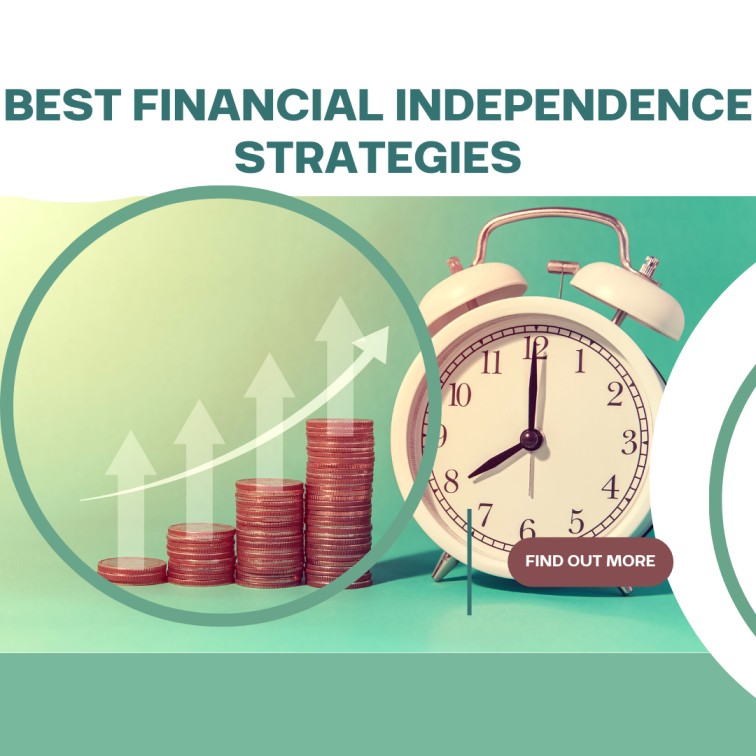Introduction: Best Financial Independence Strategies

Welcome to the ultimate guide on the Best Financial Independence Strategies. In this article, we will explore proven and effective methods to attain financial freedom and live a life free from monetary worries. Financial independence is about having enough resources to sustain your desired lifestyle without being dependent on employment or anyone else. Whether you dream of early retirement, starting your own business, or simply achieving financial security, this guide is tailored to help you succeed. Let’s delve into the strategies that can pave the way to your financial independence journey.
Best Financial Independence Strategies: The Foundations
1. Define Your Financial Goals
To embark on the path to financial independence, the first step is to define your financial goals. Setting clear, specific, and measurable objectives is essential. These may include saving a specific amount for retirement, paying off debts, buying a home, or funding your child’s education. Having well-defined goals gives you direction and purpose, making it easier to create a plan to achieve them.
2. Create a Budget that Works for You
A well-structured budget is the backbone of any successful financial independence strategy. It enables you to understand your cash flow, track your income and expenses, and identify areas where you can cut back. Start by listing all your sources of income and then break down your expenses into categories like housing, utilities, transportation, groceries, entertainment, and savings. Allocate a portion of your income towards savings and investments, ensuring you prioritize your financial goals.
3. Reduce Debt and Liabilities
Debt can be a significant obstacle on the journey to financial independence. Prioritize clearing high-interest debts like credit cards and personal loans first. Then, work on managing lower-interest debts responsibly. Paying off debt not only frees up more of your income but also improves your credit score, making it easier to access credit in the future.
4. Build an Emergency Fund
Unforeseen circumstances such as medical emergencies or unexpected job loss can disrupt your financial plans. Establish an emergency fund equivalent to three to six months of living expenses. This fund acts as a safety net, providing you with peace of mind during challenging times and safeguarding your progress towards financial independence.
5. Maximize Retirement Contributions
Contributing to retirement accounts is a crucial aspect of building wealth and securing your financial future. Take advantage of employer-sponsored retirement plans, such as 401(k)s or 403(b)s, if available to you. Additionally, consider opening an individual retirement account (IRA). Increasing your retirement contributions, especially when you’re young, allows compound interest to work its magic, multiplying your savings over time.
6. Invest Wisely for Growth
Investing is a powerful tool to build wealth and achieve financial independence. Diversify your investments across various asset classes and risk levels to mitigate potential losses. Consider investing in stocks, bonds, real estate, mutual funds, and exchange-traded funds (ETFs). Understand your risk tolerance and invest in line with your financial goals and timeline.
7. Educate Yourself Financially
Financial literacy is a vital aspect of achieving and maintaining financial independence. Take the time to educate yourself about personal finance, investments, and market trends. Read books, attend seminars, listen to podcasts, and follow reputable financial websites to stay informed. The more you know, the better equipped you’ll be to make informed financial decisions.
8. Leverage Tax-Advantaged Accounts
Tax-advantaged accounts offer significant benefits for wealth accumulation. Look into options like Roth IRAs and Health Savings Accounts (HSAs). Roth IRAs allow tax-free withdrawals during retirement, while HSAs offer triple tax advantages for qualified medical expenses. By maximizing contributions to these accounts, you can optimize your tax efficiency and boost your savings over time.
Best Financial Independence Strategies: Strategies for Acceleration
9. Side Hustles and Passive Income
Supplementing your primary income with side hustles and passive income streams can accelerate your journey to financial independence. Side hustles can be anything from freelancing, online businesses, or consulting. Passive income streams, such as rental income from real estate properties or dividend income from investments, allow money to work for you even when you’re not actively involved.
10. Pay Yourself First
The “pay yourself first” philosophy emphasizes saving and investing before allocating funds to other expenses. Treat your savings and investments as non-negotiable expenses. Automate contributions to your retirement accounts and savings, so they happen before you have a chance to spend the money elsewhere.
11. Frugality and Smart Spending
Embracing frugality doesn’t mean depriving yourself of things you enjoy; rather, it’s about making mindful spending decisions and finding cost-effective alternatives. Look for discounts, buy in bulk, use coupons, and compare prices before making purchases. Adopting a frugal mindset will help you free up more money for savings and investments.
12. Pursue Continuous Learning
Investing in your skills and knowledge can lead to better career opportunities and higher earning potential. Continuously upgrade your expertise through online courses, workshops, and certifications. The more valuable your skills are in the job market, the more you can negotiate higher salaries or seek better-paying career opportunities.
13. Real Estate Investments
Real estate investments can be an excellent way to diversify your investment portfolio and generate passive income. Consider purchasing rental properties in areas with high demand for housing. Rental income can cover mortgage payments and expenses while the property appreciates in value over time.
14. Start a Business or Side Business
Entrepreneurship offers a pathway to financial independence, giving you control over your income and financial destiny. If you have a passion or skill that can be monetized, consider starting a business or side business. Whether it’s offering services, selling products, or creating digital content, entrepreneurship opens up new opportunities for financial growth.
15. Geoarbitrage for Cost Optimization
Geoarbitrage involves relocating to areas with lower living costs while maintaining your income level. If your job allows for remote work or you’re considering a career change, moving to a region with a lower cost of living can significantly boost your savings rate. Use cost-of-living calculators to compare expenses in different locations and assess the potential benefits of geoarbitrage.
16. Maintain an Emergency Exit Fund
As you work towards financial independence, consider setting aside an emergency exit fund. This fund provides a safety net in case you decide to change career paths, start a business, or take a break from work. Having a financial cushion allows you to pursue opportunities without feeling financially trapped.
Best Financial Independence Strategies: Navigating Challenges
17. Overcome Mental Barriers
Achieving financial independence isn’t just about managing money; it also involves overcoming mental barriers and limiting beliefs about money. Negative beliefs, such as “I’ll never be wealthy” or “Money is evil,” can hold you back from pursuing your financial goals. Cultivate a positive money mindset by challenging these beliefs and adopting empowering thoughts about money and success.
18. Stay Disciplined and Persistent
The journey to financial independence may come with its share of challenges and setbacks. Stay disciplined in following your financial plan and remain persistent in your efforts. Consistency is key in achieving long-term financial success.
19. Reevaluate and Adjust Your Plan
Life is dynamic, and circumstances change. Regularly review your financial plan and adjust it as needed to align with your evolving goals and financial situation. If you encounter unexpected changes, such as a job loss or major life event, reassess your plan and make necessary adjustments to stay on track.
20. Seek Professional Advice
If you’re unsure about specific financial decisions or need expert guidance, consider consulting with a financial advisor. A professional can offer personalized advice tailored to your unique circumstances and provide insights to optimize your financial strategies.
21. Protect Your Financial Future
Insurance plays a critical role in safeguarding your financial future. Invest in health insurance, life insurance, disability insurance, and property insurance to protect yourself and your loved ones from unforeseen events that could disrupt your financial plans.
Best Financial Independence Strategies: Living a Fulfilling Life
22. Focus on Experiences Over Material Possessions
As you work towards financial independence, prioritize experiences and relationships over material possessions. Studies have shown that experiences bring more lasting happiness than material possessions. Spend time with loved ones, travel, pursue hobbies, and create memorable experiences that enrich your life.
23. Embrace Minimalism and Decluttering
Minimalism fosters a simpler and more intentional lifestyle. Embrace the concept of decluttering and letting go of possessions that no longer serve a purpose. Simplifying your life can lead to reduced stress, increased focus, and a greater sense of contentment.
24. Give Back to Society
As you achieve financial independence, consider giving back to society through philanthropy or volunteer work. Contributing to causes you care about adds meaning to your journey and positively impacts the lives of others.
25. Plan for Early Retirement
Financial independence often opens up the possibility of early retirement. Plan how you’ll spend your newfound free time, pursuing hobbies, passions, and spending quality time with loved ones. Consider engaging in part-time work or volunteer activities to maintain a sense of purpose during retirement.
Frequently Asked Questions (FAQs)
Q: How long will it take to achieve financial independence? A: The time required to achieve financial independence varies based on individual circumstances and goals. It can take several years of consistent saving, investing, and smart financial decisions. Factors such as income level, current savings, investment returns, and lifestyle choices play a significant role in determining the timeline.
Q: Can I achieve financial independence without high-income levels? A: Yes, financial independence is attainable regardless of income levels. While higher income may expedite the process, it’s not the sole determinant of achieving financial independence. By practicing disciplined saving, strategic investing, and living within your means, anyone can work towards financial freedom.
Q: Is real estate a good investment for financial independence? A: Real estate can be a valuable investment for financial independence, offering rental income and long-term appreciation potential. However, like any investment, it comes with risks and requires careful research and management. Investing in real estate should align with your overall financial goals and risk tolerance.
Q: How do side hustles contribute to financial independence? A: Side hustles provide additional income streams, accelerating your journey towards financial independence by increasing your overall earnings. These extra income sources can be used to boost savings, pay off debt, or invest in opportunities that align with your financial goals.
Q: What role does budgeting play in financial independence? A: Budgeting is essential for financial independence as it helps you manage your money efficiently, allocate funds to savings and investments, and reduce unnecessary expenses. By creating and sticking to a budget, you gain control over your finances, enabling you to achieve your financial goals more effectively.
Q: How does financial independence impact retirement planning? A: Achieving financial independence often means you can retire earlier or have more flexibility in your retirement plans. With sufficient savings and investments, you can retire comfortably without relying solely on traditional retirement funds like Social Security or pension plans. It provides you with the freedom to structure your retirement based on your desires and preferences.
Must Read; Online Business That Pays Daily With Free Registration
How Can I Earn Money Online as a Student?
Conclusion:
Congratulations! You’ve completed the journey through the Best Financial Independence Strategies. By defining your financial goals, creating a budget, reducing debt, and investing wisely, you’ll be well on your way to achieving financial independence. Remember to embrace frugality, pursue continuous learning, and leverage various strategies to accelerate your progress.
Overcoming mental barriers and staying disciplined are essential for staying on track. Don’t forget to protect your financial future with insurance and seek professional advice when needed. As you move towards financial independence, remember to focus on experiences over material possessions, embrace minimalism, and give back to society.
Financial independence is not just about money; it’s about living a fulfilling life on your terms. Plan for early retirement and enjoy the freedom that comes with achieving your financial goals. Now, armed with these strategies and insights, embark on your journey towards financial freedom and embrace the abundant possibilities that await you!



